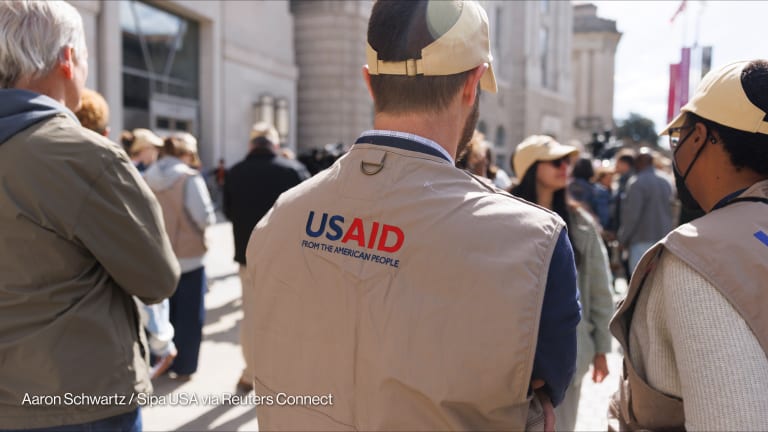Chaos, staff cuts have 'degraded' USAID's ability to vet terrorist ties
That's according to an advisory notice released by USAID's Office of Inspector General on Monday, which was published two weeks after the stop-work order began.
The ceaseless dismantling of the U.S. Agency for International Development has curtailed the agency’s ability to vet humanitarian awards for terrorist links — along with its capacity to monitor aid distributions in high-risk areas. That’s according to an advisory notice published Monday by USAID’s Office of Inspector General, a federal agency that monitors USAID’s programs to deter waste, fraud, and abuse. “Recent widespread staffing reductions across the Agency, particularly within [the Bureau of Humanitarian Assistance], coupled with uncertainty about the scope of foreign assistance waivers and permissible communications with implementers, has degraded USAID’s ability to distribute and safeguard taxpayer-funded humanitarian assistance,” the OIG found. The notice was released two weeks after a stop-work order halted billions of dollars in foreign assistance — and after 90% of USAID’s Bureau of Humanitarian Assistance, or BHA, was fired, furloughed, or locked out of agency systems. After a court order blocked more staff from being placed on administrative leave last Friday, some were given a weeklong reprieve — but most across the agency remain barred from responding to partner organizations or disbursing contracted awards. Those moves have resulted in the undermining of “two key oversight mechanisms to ensure accountability over humanitarian assistance funding,” the OIG report stated: partner vetting and third-party monitoring. It has also constrained USAID’s ability to receive and respond to allegations of misconduct across humanitarian assistance programs, the report found, with confusion around waivers for “lifesaving humanitarian aid” making things more chaotic. Today, USAID is required to vet organizations in Afghanistan, Iraq, Lebanon, Pakistan, Syria, the West Bank and Gaza, and Yemen, given known terrorist activity across those countries. Before the agency awards a contract, grant, or agreement to an organization located there, USAID must vet that organization and its key personnel. But with wave after wave of layoffs, suspensions, and lockouts, USAID’s counter-terrorism vetting unit hasn’t been able to report to work, the OIG found. “This gap leaves USAID susceptible to inadvertently funding entities or salaries of individuals associated with U.S.-designated terrorist organizations,” the advisory notice stated. A similar pattern has played out across USAID’s third-party monitoring activities, the mechanism the agency uses to oversee humanitarian programs in dangerous areas. Before the foreign aid freeze, USAID-contracted third-party monitors conducted site visits to ensure USAID programs and distributions were delivered as intended — but after Jan. 24, all third-party monitoring was suspended. That’s affected programs in some of the most difficult contexts, including Afghanistan, Ethiopia, Haiti, Gaza, Somalia, Syria, and Ukraine. On Jan. 29, Secretary of State Marco Rubio approved a waiver for lifesaving humanitarian aid — an exception which, on paper, should have applied to lifesaving medicine, food, shelter, and “subsistence assistance” across the world. In practice, those waivers have been anything but. With most staff from USAID’s Bureau of Humanitarian Assistance suspended or locked out of their accounts, most organizations haven’t been able to contact their USAID counterparts for more waivers or information. And for most that have received waivers, those exceptions haven’t been matched with funding. The OIG report found another impact of waiver confusion: with USAID staff unable to communicate with partner organizations (and the firing of thousands of contractors within the bureau), USAID has been unable to "receive and respond” to allegations of abuse. That impacts the agency’s mandatory reporting obligations to Congress. “According to BHA staff, the placement of most of its staff on administrative leave is preventing the bureau from responding to USAID OIG audit requests, reports of investigative findings, and other routine OIG oversight inquiries,” the notice stated.
The ceaseless dismantling of the U.S. Agency for International Development has curtailed the agency’s ability to vet humanitarian awards for terrorist links — along with its capacity to monitor aid distributions in high-risk areas.
That’s according to an advisory notice published Monday by USAID’s Office of Inspector General, a federal agency that monitors USAID’s programs to deter waste, fraud, and abuse.
“Recent widespread staffing reductions across the Agency, particularly within [the Bureau of Humanitarian Assistance], coupled with uncertainty about the scope of foreign assistance waivers and permissible communications with implementers, has degraded USAID’s ability to distribute and safeguard taxpayer-funded humanitarian assistance,” the OIG found.
This article is free to read - just register or sign in
Access news, newsletters, events and more.
Join usSign inPrinting articles to share with others is a breach of our terms and conditions and copyright policy. Please use the sharing options on the left side of the article. Devex Pro members may share up to 10 articles per month using the Pro share tool ( ).
Elissa Miolene reports on USAID and the U.S. government at Devex. She previously covered education at The San Jose Mercury News, and has written for outlets like The Wall Street Journal, San Francisco Chronicle, Washingtonian magazine, among others. Before shifting to journalism, Elissa led communications for humanitarian agencies in the United States, East Africa, and South Asia.








